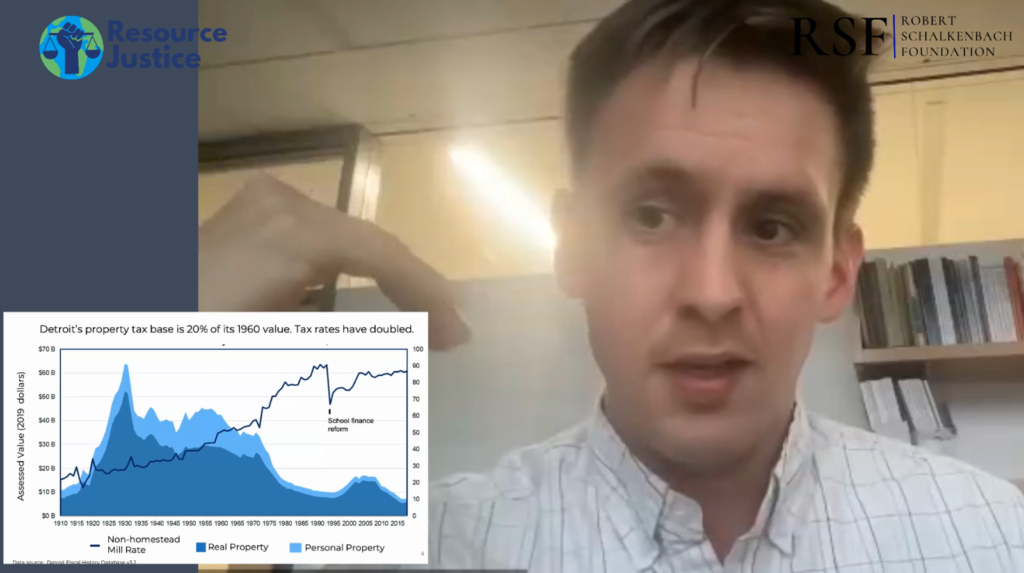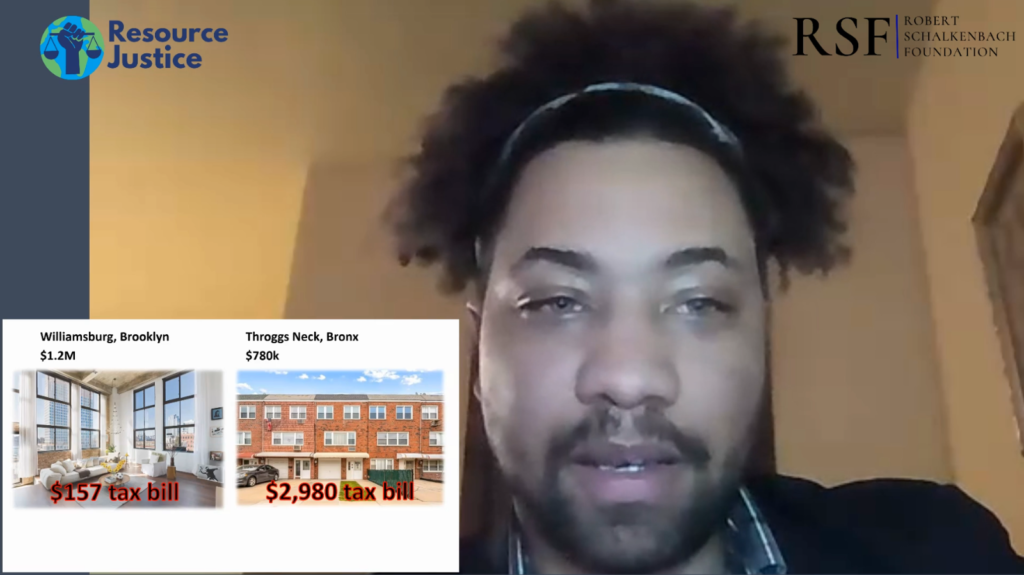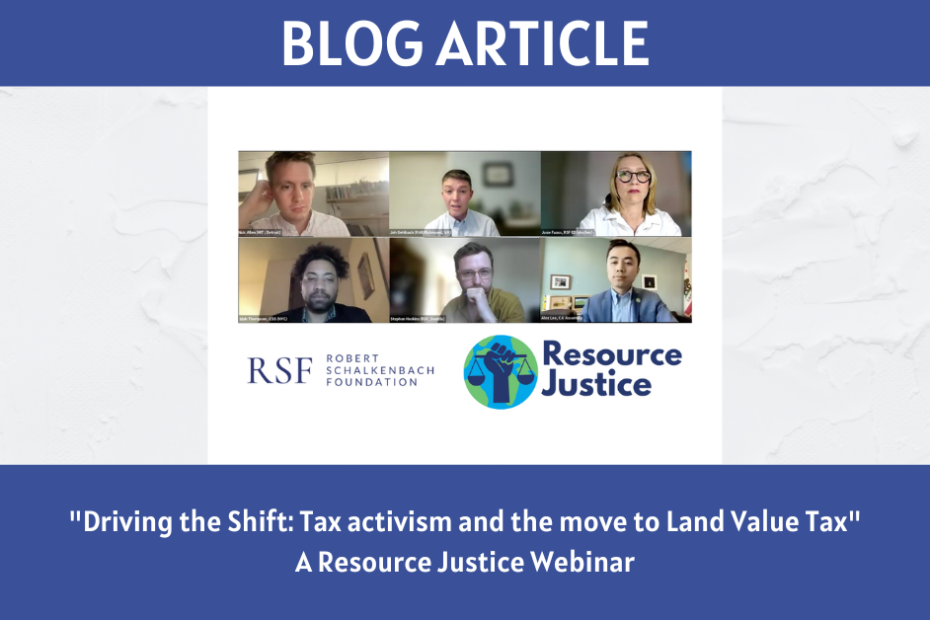Here at the Robert Schalkenbach Foundation, our research initiative Resource Justice recently hosted an event called Driving the Shift, as a forum to hear from local efforts to advance land value tax policies in places throughout the U.S. We were lucky enough to hear from a diverse range of speakers, including academic insights on Detroit; a state Assemblymember for California; from within the real estate industry in Richmond, VA; and the equity and social welfare perspective in New York City. Likewise, we heard the potential for land value tax to help ease punitive tax burdens on investment, discourage land speculation, respond to rapidly rising demand for housing, and simplify complex and regressive property tax structures. This article will explore key insights from the event, but we invite interested readers to watch the full webinar recording on our YouTube page.
Nick Allen, Detroit
After welcoming remarks from our Executive Director Josie Faass, we first heard from Nick Allen, a PhD candidate at MIT who co-authored the report Split Rate Taxation in Detroit: Findings and Recommendations and has been helping the City of Detroit design a potential land value tax shift. Nick explained that since the exodus of Detroit’s car manufacturing industry in the 1960s, the city has seen its property tax base evaporate, forcing tax rates to double in compensation. Low land values make it cheap to hold land for speculative purposes, while high taxes make it infeasible to maintain homes and invest in new construction. To relieve tax costs for residents and stimulate economic development for Detroit, Nick’s team have designed a “local-option, revenue-neutral land value tax”. We heard how legislation would allow communities in Michigan to vote for tax relief on their homes and businesses, which would be offset by a new tax on land values. Current models suggest that with a tax rate on land which is 3 to 4 times higher than that on buildings, 97% of all homeowners would see an immediate decrease in their tax bill, with savings of around $1,200 per year for the median home.
Turning to strategy, Nick explained that his team began by building a coalition of supporters interested in the long-term recovery of Detroit, undertook a careful series of studies looking at the fiscal and distributive impacts of a land value tax shift, and then drafted legislation that could handle the complex nature of such a policy change. From here, Michigan will need state legislation to allow such a local option tax shift, followed by a local vote within Detroit. Nick is optimistic that land value tax might be given the chance to help foster an equitable revitalization of Motor City.

Assemblymember Alex Lee, California
Next, we were glad to hear from Assemblymember Alex Lee, who represents California’s 24th Assembly District and has been championing both social housing and land value tax in the Golden State. Asm Lee explained that tax limits imposed by Prop 13 mean that many homes in his district are worth over $1.5 million but pay less in property taxes than a typical home in Detroit. He explained that these constraints have led to inequitable property taxes, caused revenue problems for municipal budgets, and have rewarded land speculation and underbuilding of homes in one of the most hotly demanded parts of the country. Hoping that land value tax could help mitigate these issues, Asm Lee introduced bill AB362 which would ask the State of California to study the potential benefits of a statewide land value tax system. Crucially, such a study would include analysis of the real “dollars and cents” change in tax burdens for different types of taxpayers and homeowners, as well as the potential for land value tax to encourage much-needed infill housing to help ease California’s housing crisis.
Unfortunately, despite only proposing to study land value tax, this bill was met with strong opposition from business associations and taxpayer groups eager to preserve the status quo, meaning that the bill did not make it out of committee. Asm Lee emphasized the importance of having high quality studies, like those in Detroit, to help clearly communicate the implications of LVT to taxpayers. Moving forward he hopes that this work could still proceed through other channels, and encouraged Californians to write to their representatives expressing their interest in a LVT study and asking for AB362 to be heard.

Joh Gehlbach, Richmond
Providing us with some perspective from the private sector was Joh Gehlbach, VP of Government Affairs at the Richmond Association of Realtors®. Joh explained that an influx of population combined with an inability to annex surrounding areas for housing has led to rising rents and displacement of longtime residents, prompting policymakers to look for possible solutions, including LVT. Because Virginia is a Dillon Rule state, legislation was required to allow Richmond to enact a split-rate tax, and SB725 passed in 2020.
Since then, Councilman Andreas Addison has led an effort to foster awareness of the potential benefits of a split-rate LVT for Richmond and build a coalition of experts and policymakers around the topic. Joh and RA Realtors® are excited that an LVT shift could improve incentives for housing densification in Richmond’s many streetcar neighborhoods and also help shift the tax burden off of homeowners and into the downtown core. A crucial next step, which we at Resource Justice have been helping to advance, is to study the impact of such a tax shift on household tax bills, especially given that this is likely to take place alongside a rewrite of Richmond’s zoning code to enable more intensive land uses.

Iziah Thompson, New York City
Our last panel member to present was Iziah Thompson, who is a Senior Policy Analyst at the Community Service Society, social welfare organization which champions economic equity and opportunity in NYC. Despite New York having been the home of Henry George’s 1886 mayoral campaign, Iziah acknowledged that advocacy for LVT is just now being reinvigorated after a long hibernation. Setting the scene, he explained that there are constant fights in New York around vacant land and apartments, the 421a tax abatement for affordable housing development. Likewise, the property tax system is beset by assessment limits, higher effective tax rates on the multifamily homes where low-income households tend to live, and a generally opaque and inequitable system overall.
As pressure grows to resolve these issues, Iziah sees this as a valuable opportunity to grow support both for tweaks to improve the system, and ultimately a more substantive move towards LVT. His strategy involves first building awareness of inequities in the current property tax system, followed by demonstrating the importance of land and LVT to fully fixing NYC’s tax system. Iziah believes that a strong coalition of LVT supporters can be built across pro-housing, fair housing, transit and renters rights advocates. Support will be needed along the way, both through collaboration, funding, and sharing of lessons-learned from LVT advocacy elsewhere. Resource Justice will be working with Iziah and CSS throughout this process.

Q&A
Our event then moved to a panel discussion moderated by our Research Director, Stephen Hoskins. We discussed the types of groups who can be brought into coalition around LVT, starting from the appealing prospect of a thriving city, but can range from those homeowners who stand to enjoy reduced tax bills; developers, pro-housing & transit advocates, and tenants who can all benefit from greater housing supply. We explored ways to smooth the transition to LVT for those who it may adversely affect in the short-term, with Nick emphasizing that gradual phase-ins and careful policy design to maximize the winners are both essential, and Joh stressing the importance of identifying groups who have been marginalized in the past and being sure not to further harm them in the process. Expanding on this theme, the panel discussed ways to ensure that the pro-growth effects of LVT won’t also accelerate gentrification, with Iziah emphasizing that tenant protections like rent stabilization, good cause and rental subsidies can help keep low-income renters in their neighborhoods even while housing growth takes place around them. Further discussion explored the overall effects that a split-rate tax shift is likely to have on home values, the role of assessors offices in updating land valuations during a LVT shift, and the benefits of explaining the key feature of this policy as a ‘universal tax exemption’ for buildings.
Several key themes emerged from this event, especially around the essential need to build a coalition between supporters of LVT, social groups who it will benefit most, and folks invested in the long-term, equitable growth of their cities. A common path for getting LVT on the policy table was to start with a rigorous study of the likely impact on tax bills and key outcomes, carefully design the policy to ensure it directly benefits the largest number of people, pass enabling legislation, followed by a smooth transition into LVT. We encourage readers to check out this lively discussion in the webinar recording below.

